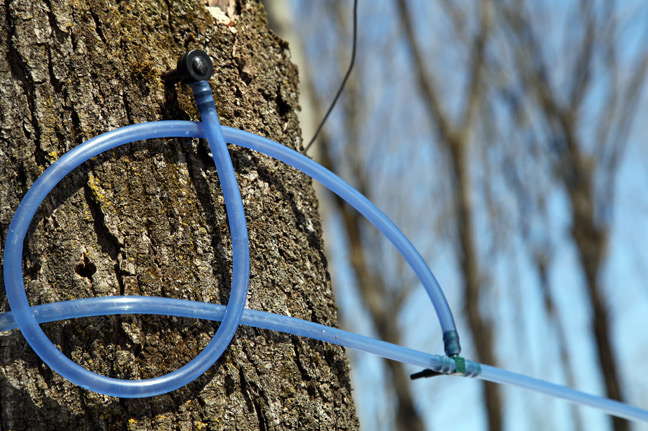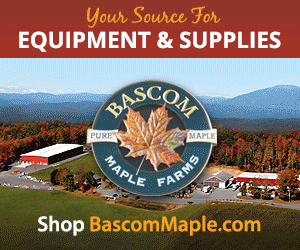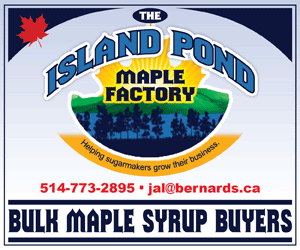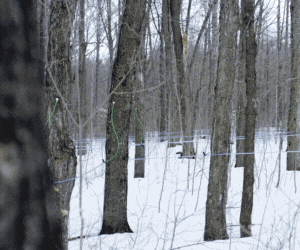UVM Proctor Page
Some confusion over IPA usage
Do not use isopropyl alcohol as a maple sanitizer in the United States
By VARIOUS CONTRIBUTORS | MARCH 2016
Increased attention to spout and tubing sanitization has led to rising sap yields for maple producers. Cleaning and replacement (use of new spouts, use of Check-valve spouts or adapters, or replacing spouts and droplines) strategies have different effects on sap yields, and each carry their own costs in terms of supplies and labor to implement the various approaches, and thus each has a different net profit.
This topic has been extensively studied, and an on-going study by researchers at the University of Vermont and Cornell University has verified the effectiveness and net profit of each of the major ways of achieving good sanitization in maple operations. A report detailing these findings and a computer-based tool to help producers determine the optimal sanitization approach to use in their operation is expected to be available later in 2016.
Many people may simply assume that the use of IPA would be governed by the U.S. Department of Agriculture. That is not the case.
Considered a pesticide
In the United States, chemicals used to clean and sanitize spouts and tubing in maple operations are regulated by the Environmental Protection Agency (E.P.A.). Some Federal Drug Adminstration (F.D.A.) regulations under Title 21 may also pertain. IPA, like many sanitizers, are considered to be pesticides. The mode of action of these substances is to remove or kill microbes existing in the system and to prevent regrowth, thus protecting the tubing and the materials passing through the tubing from the harmful effects of microbial growth.
To be legal to use in the U.S., sanitizers must be registered for use with the E.P.A. after they have undergone a review process to document their efficacy and safety, and labels must include certain precautions and specific instructions for the type of use for which they are to be employed.
Most sanitizers used in maple operations are registered sanitizers, and include statements for use on surfaces such as maple tubing. Producers using these sanitizers should carefully read the label to understand any hazards associated with their use, and follow instructions on the application of the sanitizer, any rinsing requirement (often satisfied by allowing the first sap of the season to run on the ground) and the safe disposal of any residues.
Registered for use in Canada
Isopropyl alcohol (IPA) is a commonly used maple spout and tubing sanitizer used extensively in Quebec. IPA is registered for use in maple tubing systems in Quebec and throughout Canada, and publications are available in both French and English detailing how IPA should be used.
When used according to instructions, IPA does appear to have some level of effectiveness against some types of microbes occurring in maple tubing systems. The labeling on at least some of the IPA products that are available are unclear or contradictory, stating “No-Rinse” in some places, but requiring producers to “…dispose of maple sap collected until alcohol has been eliminated from the system”, although there are no instructions advising how to determine that point. In addition, the instructions of one product state on one part of the label to, “Spray product directly on hands” as a sanitizing hand dip, but the precautions say to “Avoid contamination with skin…”, “Wear impervious gloves”, and to “Wash contaminated skin with soap and water” in other sections.
At best, this is highly confusing and doesn’t meet U.S. pesticide labeling requirements.
It has come to our attention that some maple equipment companies in the U.S. are offering IPA in their catalogs and in their stores, are selling the equipment to dispense IPA in tubing, and are providing instructions in its use in maple operations. We have also spoken with several U.S. producers who have asked about, already tried, or are currently using IPA. Using this product is illegal.
Regardless of the availability and guidance provided, maple producers should clearly understand that THE USE OF ISOPROPYL ALCOHOL IN MAPLE TUBING SYSTEMS ANYWHERE IN THE UNITED STATES IS A VIOLATION OF FEDERAL LAW. Syrup produced from tubing systems in the U.S. employing IPA could therefore be considered contaminated according to U.S. E.P.A. regulations. Any syrup produced with IPA in the U.S. could be seized and destroyed by Federal or State regulators.
The availability of IPA by maple equipment vendors in the U.S. and the acceptance of IPA by Canadian authorities does not convey any regulatory protection for maple producers using IPA in the U.S.
Therefore, we strongly encourage maple equipment and supply companies in the U.S. to cease making IPA available to U.S. producers, and for maple producers using or considering using IPA as a sanitizer to refrain from doing so until such time as IPA is registered with the E.P.A. for use in maple tubing systems.
This article was written by T.D. Perkins and A.K. van den Berg with the University of Vermont, Proctor Maple Research Center, Underhill Ctr, VT; K. Hopkins with the University of Maine Cooperative Extension, Skowhegan, ME; H. Marckres with the Vermont Agency of Agriculture, Food & Markets, Montpelier, VT; S. Roberge with the University of New Hampshire Cooperative Extension, Keene, NH; S. Childs with the Cornell University Maple Program, Ithaca, NY; G. Graham with the Ohio State University Extension, Wooster, OH; and M. Farrell with the Cornell Maple Program, Uihlein Forest, Lake Placid, NY.































